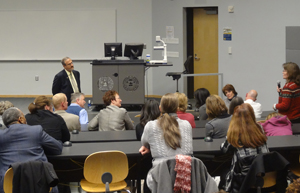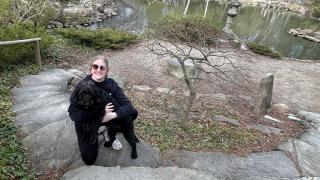
 President Mark Schlissel met with faculty, staff and students Thursday to discuss the needs and opportunities facing UM-Dearborn
President Mark Schlissel met with faculty, staff and students Thursday to discuss the needs and opportunities facing UM-Dearborn
His visit ended with an open campus forum for faculty, staff and students. An estimated 175 attended the forum, where Schlissel discussed what he has learned about campus and listened as attendees shared what they thought was unique about UM-Dearborn.
“I’m a big believer that each of our campuses really has something to add to the whole by being who they are…bringing your virtues and your talents, your uniqueness to the table,” Schlissel said. “In order for me to broker that and do that really well I have to understand, as I’m coming to understand, the mission and the community you serve and the ways that you serve it.”
Schlissel touched on a number of topics, including:
Diversity
“I’m enormously impressed by the fact that 25 percent or so of your students are students of color,” Schlissel said. He added he hopes the entire U-M system will be able to achieve the level of diversity seen on UM-Dearborn’s campus.
He also commented on the number of first generation students on campus, saying, “I think you should take great pride at being able to tap into that demographic in our society—talented students, without a doubt—and help them achieve a college education and graduate in a way that I’m sure they’re going to go back and lift up their families and their communities.”
Enrollment growth
Schlissel said UM-Dearborn’s growth, along with the continued academic achievement of incoming students, was too be praised.
Throughout the visit, faculty and students told him that small class sizes and faculty interaction with students was an important part of the campus culture. He said UM-Dearborn should not lose sight of those factors as the campus grows.
“If we’re going to grow, we have to grow proportionally. We have to provide both the advising and the faculty scale so that we don’t lose what’s special about the campus,” Schlissel said.
Graduation rates
Schlissel discussed the university’s graduation rate with Chancellor Daniel Little earlier in the day, telling forum attendees, “I didn’t understand at first in this context, but Chancellor Little has helped me and I realize you do an excellent job of transforming lives through education, which is a big part of why we’re all in this business… We should approach all our students as figuring out what we can do to help them graduate from college.”
Community engagement
On Wednesday, UM-Dearborn received the Community Engagement Classification from the Carnegie Foundation for the Advancement of Teaching. Schlissel applauded what he saw as a campus-wide effort to conduct socially oriented projects in the community surrounding UM-Dearborn.
“We’re a public institution. What that means to me is the research that we do, the scholarship we do should really have as one of its goals serving the public… I think it’s a wonderful thing that this is part of your orientation,” he said.
The relationship between Ann Arbor, Dearborn and Flint
Schlissel said each campus has unique characteristics and he would like to see the campuses think of ways they can partner more effectively, including taking advantage of industry and community connections as wells as research opportunities.
“That’s one of the things I hope to accomplish in the years ahead, is to identify where these points of synergy are amongst the three campuses and try to find ways to promote them,” he said.
When asked about leveraging U-M’s applicant pool, Schlissel said he first plans to determine the extent to which the applicant pools overlap.



